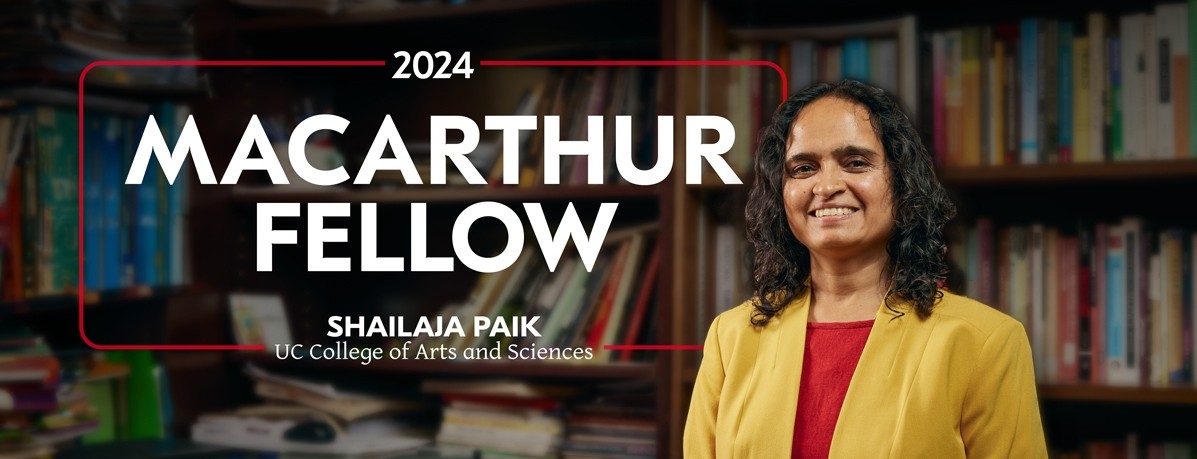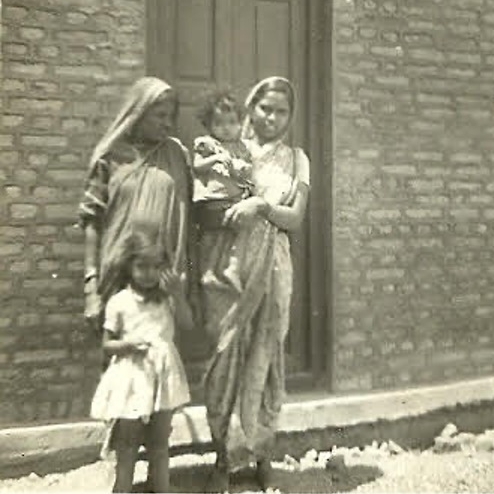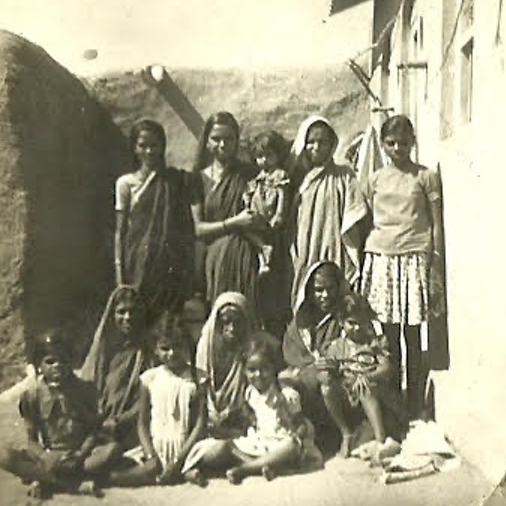
UC professor named MacArthur fellow
Shailaja Paik receives ‘Genius Grant’ to continue her work with Dalits, ‘the Untouchables'
When the phone rang on a September afternoon, University of Cincinnati's Shailaja Paik, PhD, tired from a full day of meetings and teaching, did not expect to hear news that would leave her “ears numb.”
“I had been named a (MacArthur) fellow, and I wasn’t sure I was hearing correctly, but I tried to keep my cool,” she remembers, chuckling. “I thought, ‘Is this right? I’m going to ask her to repeat herself.’
“I was ecstatic.”
The MacArthur Fellows Program, also called the "Genius Grant," is a prize awarded annually by the John D. and Catherine T. MacArthur Foundation to between 20 and 30 “extraordinarily creative individuals with a track record of excellence in a field of scholarship or area of practice, who demonstrate the ability to impact society in significant and beneficial ways through their pioneering work or the rigor of their contributions." This year, the foundation selected 22 fellows, one of which is Paik.
MacArthur fellows receive a grant of $800,000 over five years, no strings attached, to help advance their academic pursuits; fellows are nominated and endorsed by their peers. They do not apply and are never interviewed for the fellowship before it’s awarded.
We are so thrilled that Dr. Paik has been recognized for her remarkable scholarship working with a population of people who have been overlooked and discriminated against for centuries.
UC President Neville G. Pinto

Shailaja Paik, PhD, on UC's Uptown campus. Photo/Joseph Fuqua II/UC Marketing + Brand
“I have had friends and colleagues who have told me that I should be the recipient of this award, but it’s not something I can apply for, so getting the call was a shock,” she says. “I do know people who have become fellows in the past, and their work is incredible, so to be in the same group of geniuses means a lot to me, and it means a lot for the work I have done over long years.
“I’m happy to have the ‘big genius’ feather in my cap, now.”
Paik, a Charles Phelps Taft Distinguished Research Professor of History and affiliate in Women's, Gender, and Sexuality Studies, Asian Studies and sociology in UC’s College of Arts and Sciences, is only one of 10 MacArthur Fellows to be named in Ohio and the first ever in both the city of Cincinnati and the University of Cincinnati since the award began in 1981.
“This is one of the highest recognitions for intellectual accomplishment and impact that a faculty member can win globally,” said UC President Neville G. Pinto, who called Dr. Paik to congratulate her. “We are so thrilled that Dr. Paik has been recognized for her remarkable scholarship working with a population of people who have been overlooked and discriminated against for centuries.”
The Dalits, 'the Untouchables’
Paik says caste is a complex system made up of many distinctions of ranked groups that marry within the limits of a certain community. It is a division of society based on differences of inherited social rank or privilege, profession and occupation, and it continues to exist in India’s society, politics and economy. The term Dalit means “the oppressed,” and it is the lowest stratum of the caste in India.
“To be a Dalit, is to be born Dalit, is to be born into a caste system that sanctions Dalits as impure, polluted, and hence, ‘Untouchable,’” says Paik. “Dalits comprise about 17% of India's population and historically they have not been allowed access to education in any form, access to common public goods, in terms of public tanks, water wells or even some of the most basic things like wearing footwear or new, clean clothes, even if they can afford them. To be a Dalit woman is to be doubly oppressed, that is both by the politics of caste as well as gender. To be a Dalit woman is to be the ‘Dalit of the Dalit, slave of the slave.’
“This is a community that I belong to, and it has been the center of my research and writing for 25 years.”

Shailaja Paik’s childhood home in Yerawada Pune, Maharashtra, India. Photo courtesy Sarita Paik.
Paik grew up in the city of Pune with her three sisters in a 20-by-20-foot room. They lived in a tenement in the Yerawada slums.
“We did not have a regular water supply or a private toilet and, yes, I grew up with garbage and dirt around me, and pigs roaming the alleys. I am still traumatized by the memories of the public toilets,” she says.
Paik remembers carrying large vessels of water for cleaning and cooking on her head from the city public water tap.
“It has a very deep impact — socially, educationally, emotionally, psychologically,” she adds.
However, Paik’s father, Deoram F. Paik, sought an “English education” for his children, as a way to help them find their way to a better future; she said her mother, Sarita Paik, also protected her and her sisters, making sure that the dangers of their environment didn’t interfere.
“Studying was a challenge, so I remember wrapping myself up in a quilt and telling my family members to speak softly and not make any noise," she recounts. "I would go to sleep around 7:30 p.m. until around 2 or 3 a.m., then get up at that time and study until 6 or 7 a.m. and then get ready for school. This was the time I carved out to study and learn.”


Above left: Sarita Paik, Shailaja Paik’s mother (right), holds her in her arms. Above right: Shailaja Paik in her mother’s arms (standing second from left). Courtesy of Shailaja Paik.
She was the first Dalit person to attain the highest scores in high school. This set the trajectory for where she is today.
“I just poured myself into academics — education and employment were the magic wands to escape the slum,” she says.
“This fellowship is a celebration of the enormous contributions of Dalits — their ideas, actions, history and fight for human rights. It is a fantastic reminder of the contributions Dalit studies as well as me, a Dalit woman scholar, have made to the different fields of knowledge,” Paik adds. “After experiencing discrimination in terms of caste, gender and race, I have worked my way up and out from the under with grit, determination and hard work. Dalit women shared their lives with me, and I am indebted to them as well as my advisors, mentors, colleagues and friends who have participated in this journey.
"I hope this achievement will strengthen the fight of both Dalits and non-Dalits against caste discrimination in and beyond South Asia.”
Shining a light on oppression
In addition to being named a MacArthur Fellow, in her time at UC, Paik has been awarded the Frederick Burkhardt Fellowship from the American Council of Learned Societies, the Stanford Humanities Center Fellowship, the American Institute of Indian Studies Fellowship, the Luce Foundation Fellowship and the 2023 John F. Richards Prize, as well as the Ananda Kentish Coomaraswamy Prize, in South Asian History for her book, “The Vulgarity of Caste: Dalits, Sexuality and Humanity in Modern India (Stanford University Press, 2022).”
She says this funding will allow her to continue her research and writing, helping educate others and creating documentation about the lives of the Dalits and the caste system.
“Official historical records have failed to document the lives and actions of the oppressed,” she says. “As a result, I have created my own methods and archives to record the experiences of the most oppressed. Focusing on multilingual and multi-archival research, methodologically, I adopt an integrative, mixed-methods approach and juxtapose hitherto neglected, unexamined and under-examined English and Marathi materials in archives, ethnographies, popular writings and films, to offer a fuller understanding of India’s history.”
The biggest problem is when people, especially the oppressors, try to push the burden of fighting discrimination onto the oppressed. We need to stand together and support each other through all this for our global collective humanity.
Shailaja Paik, PhD, MacArthur fellow
“I couldn’t be more pleased for Professor Paik,” says Pat Limbach, PhD, vice president for research at the University of Cincinnati. “Being recognized as a MacArthur fellow is one of the highest honors that can be bestowed upon a scholar. Her work has been transformative — giving voice to the voiceless — and she herself is a testament to the power of education. Dr. Paik is a shining example of the impact and importance of scholarly work, and I am so proud that she will have an even larger platform through the John D. and Catherine T. MacArthur fellowship.”
"This is a great and well-deserved honor for Professor Paik and a testament to the impact our faculty in UC's College of Arts and Sciences are making in the world," adds Dean James Mack, PhD. "She has a passion for making the world a better place, and I know the investment that the MacArthur Foundation is making in her scholarly work will have a global impact in various communities. Professor Paik’s research exemplifies the critical role of the humanities in sharing human experiences and driving change. We are truly fortunate to have her as a member of our university community."
Paik says that part of her mission is to spread the message that it takes more than the oppressed to overcome oppression — it takes all of humanity.
“We need to work together to battle this and do the anti-racist, anti-caste, anti-patriarchal work,” she says. “The biggest problem is when people, especially the oppressors, try to push the burden of fighting discrimination onto the oppressed. We need to stand together and support each other through all this for our global collective humanity.”
Read more about Paik and her work.
Featured image at top of Shailaja Paik, PhD, courtesy of the MacArthur Foundation. Graphic created by Kerry Overstake.
Impact Lives Here
The University of Cincinnati is leading public urban universities into a new era of innovation and impact. Our faculty, staff and students are saving lives, changing outcomes and bending the future in our city's direction. Next Lives Here.
Related Stories
UC professor named MacArthur fellow
October 1, 2024
Shailaja Paik, PhD, from UC's College of Arts and Sciences, has been named a MacArthur Fellow. She is only one of 10 MacArthur Fellows to be named in Ohio and the first ever in both the city of Cincinnati and the University of Cincinnati.
New MacArthur 'genius' says she defied caste prejudice thanks to parents
October 2, 2024
UC College of Arts and Sciences professor Shailaja Paik, PhD, discusses her story, life's work and becoming a 2024 MacArthur fellow, one of the most prestigious awards for creative and intellectual achievement — informally known as “the genius grant.”
From the slums of India to prestigious fellowships
February 26, 2020
UC faculty member Shailaja Paik rises above the oppression of the Indian caste system through education
